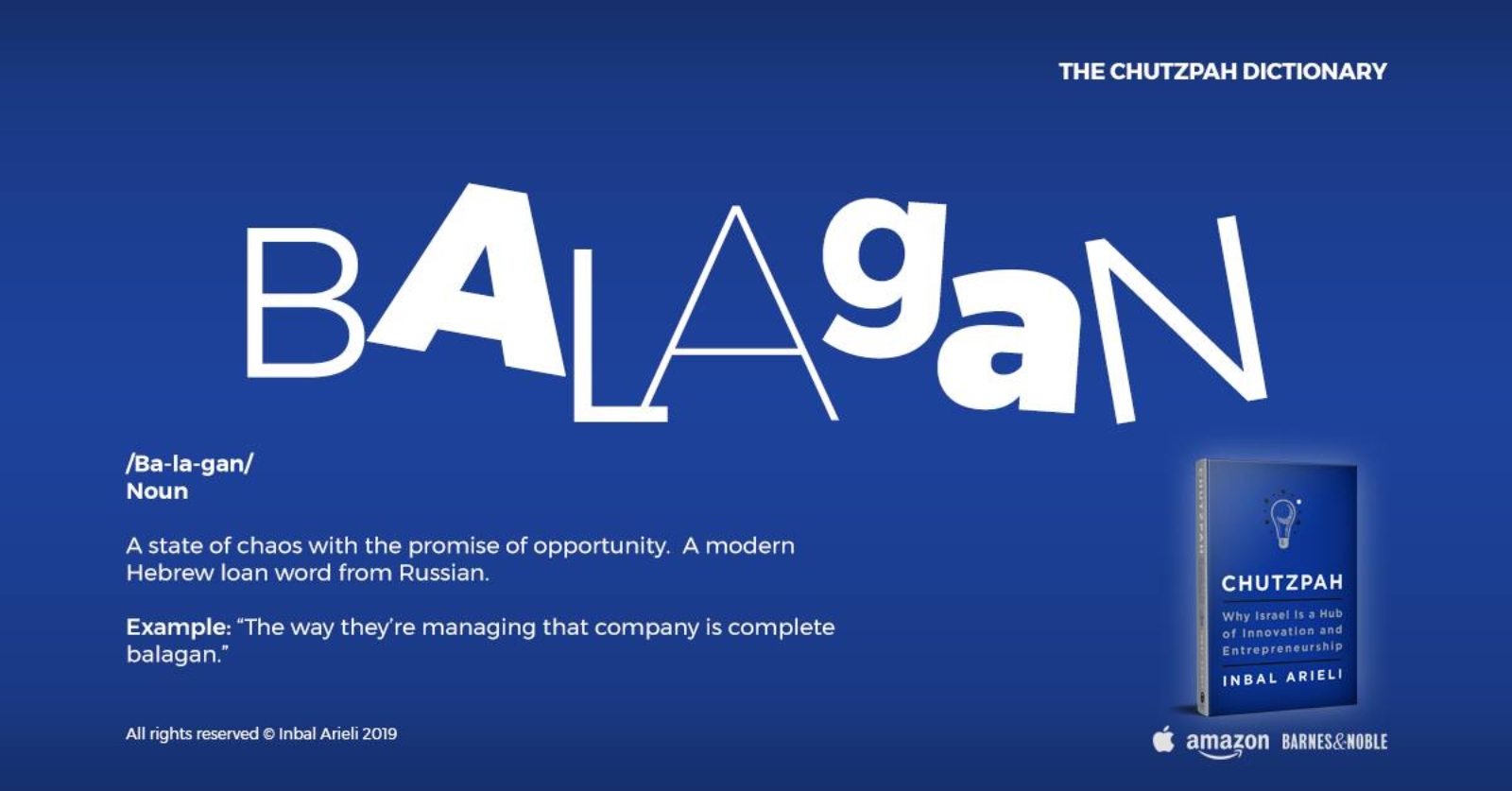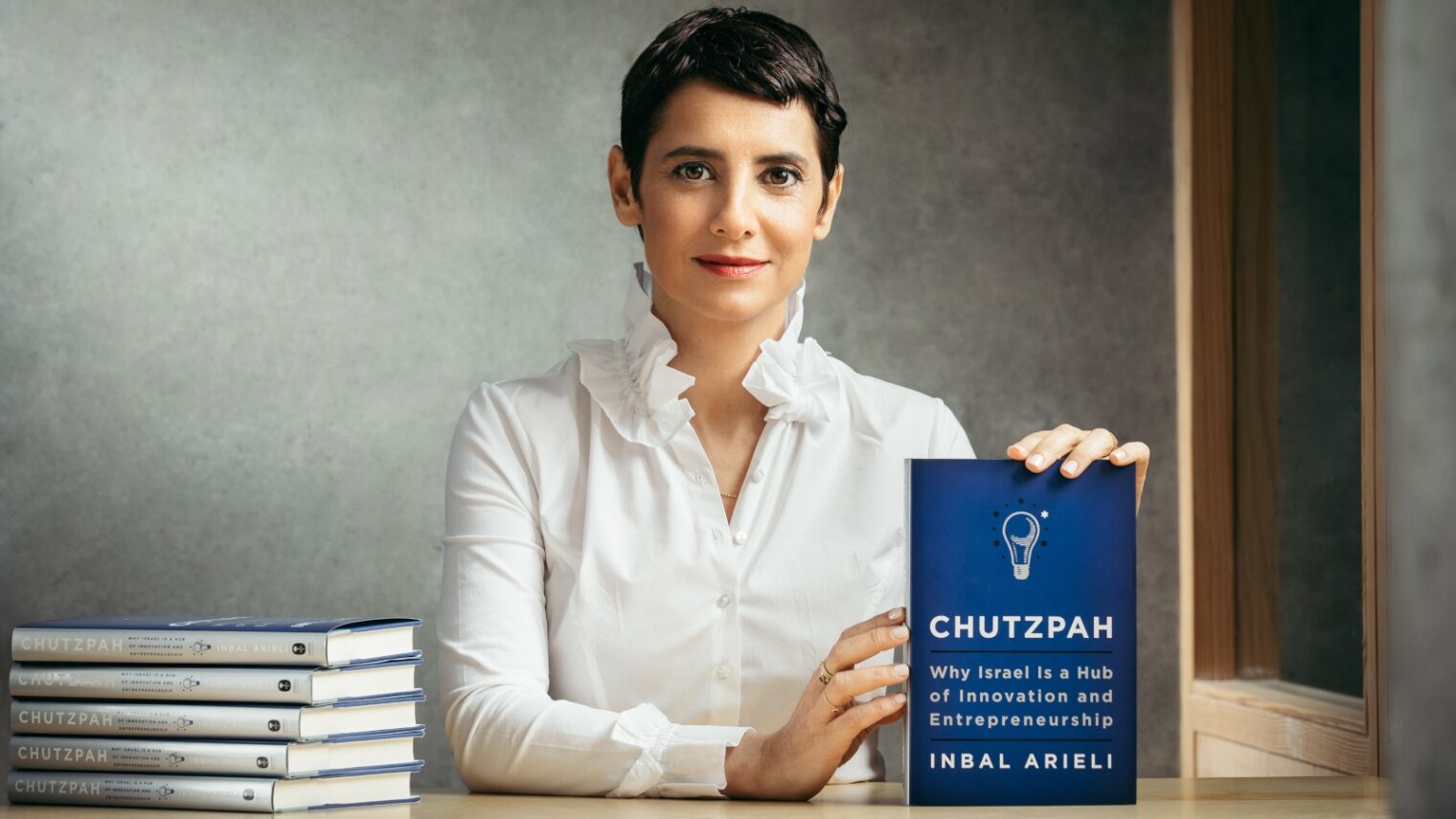If you drew a word portrait of Inbal Arieli, you’d definitely include “self-confident,” “smart” and “successful.” But the picture would be incomplete without the Yiddish/Hebrew term “chutzpah” to describe this Israeli businesswoman, mother, blogger – and now author of Chutzpah: Why Israel Is a Hub of Innovation and Entrepreneurship.
“Chutzpah” is famously hard to translate. You might say that a person with chutzpah has moxie, nerve, audacity, attitude… or in British parlance, cheek. Arieli calls it “a determined approach to life.” Maybe it’s a little rude, but it gets results.
Israeli chutzpah is what empowers children to challenge their teachers and later promotes the pursuit of impossible ideas that may result in failure or a Nobel Prize.
Arieli says chutzpah is an essential spice in the secret sauce of Israel’s innovation culture because it fosters entrepreneurial skills from a young age. Her book proposes structures, concepts and 
“My book presents traits or skills which could be trained. We all have the same anatomy and it’s a question of which muscles you train more. Israelis train specific muscles over others but it’s possible for others to do that, too,” she tells ISRAEL21c.
Those “muscles” have Israeli nicknames that, like chutzpah, are hard to translate.
Arieli explains them in her book and turned them into the Chutzpah Dictionary, a series of lighthearted social-media posts created by Tel Aviv-based Studio OneGroup to introduce concepts such as firgun and balagan.

What it means to grow up in Israel
The idea for the book originated with Arieli’s gig as a live commentator on Israeli startups showcased at the 2013 AIPAC National Summit in California.
When she was interviewed on stage about what’s so special about Israel’s high-tech ecosystem, she said that most people think its success stems from nearly universal military service at age 18.
Military service does play a significant role in making Israeli teens facile decision-makers, creative thinkers and risk-takers, acknowledges Arieli, who was a lieutenant in the elite 8200 intelligence unit and founded 8200 EISP (Entrepreneurship and Innovation Support Program).
But she wanted her audience to understand that the process starts way before an Israeli teen puts on an Israel Defense Forces uniform.
“So I showed pictures of my own kids and shared instances of what it means to grow up in Israel. There’s so much happening before the military.”
Many people at the summit were intrigued and asked her where they could read more about childhood in Israel.
“To the first person I said, ‘I don’t know; email me.’ To the second person I said, ‘Let’s grab coffee.’ To the fifth person I said, ‘You’ll have to wait because I’m writing a book about it.’ That was the moment I decided to do it,” Arieli says.
“I saw it’s very difficult for outsiders to relate to the Israeli military experience. But when you start talking about how to train kids to foster entrepreneurial skills, they see it can be relevant to them.”
She began sharing these ideas on her blog and in popular guest columns for ISRAEL21c, starting with “Why lighting bonfires is the secret spark behind Israel’s innovation” in May 2015.
A new angle on Israel
Ordinary people approach their first book project by finding an agent to shop around the concept to publishers. That’s not how a woman with chutzpah does it.
Instead, Arieli used her columns to validate her ideas (“just as I’d do with a startup”) and determine which topics most piqued the interest of readers.
“Seeing ISRAEL21c readers’ reactions to some of the early articles I wrote strengthened my belief that this was a topic of interest and that diverse types of people wanted to hear more about it,” she says.
“Parents were an obvious audience but actually it helped me see that entrepreneurs and business leaders reading about Israeli childhood understood how it related to them. It showed a new angle of Israel that a lot of people didn’t know.”
After choosing the topics to include in her book, Arieli pored over academic studies on Israeli culture and delved into resources from the World Economic Forum and especially from Start-Up Nation Central, where she formerly served as a senior adviser.
She also interviewed top Israeli entrepreneurs about their childhoods.“It was super interesting to see what helped them grow into who they are.”
Then she wrote the full manuscript. It was only afterward that she was given a connection to a literary agent, who took Arieli to meet with five major publishers on a Friday morning in New York.
Chutzpah was released today (August 20) by HarperCollins’ Harper Business imprint. A US book tour soon begins.
Arieli will be juggling the tour with her job as co-CEO of leadership assessment and development company Synthesis, which trains corporate managers in a unique methodology fusing narrative psychology with IDF technology.
She and co-CEO Shirley Schlatka infused their American-oriented business with the Israeli-oriented principles of dugri and tachles, roughly translated respectively as “straightforward” and “cut to the chase.”
Yes, you’ll find those two terms illustrated in Chutzpah.
To order the book, click here.

















